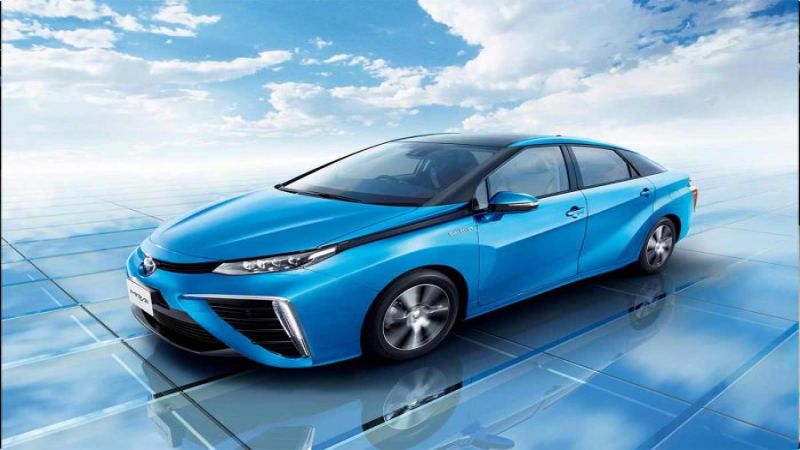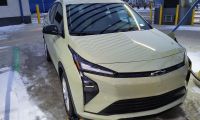While many carmakers are making a shift to battery-electric and plug-in hybrid vehicles as a solution to growing concerns over traditional gasoline-fueled internal combustion engine vehicles, Toyota/Lexus argues that hydrogen fuel cell vehicles are the ultimate solution. They claim that it only makes sense to look at current plug-in EVs as stepping stones on the path to mass adoption of hydrogen fuel cell vehicles.
A major issue Toyota has is that they believe it’s easier to market an eco-friendly vehicle that refuels in just a few minutes than it is to market one that takes a few hours to charge.
Hydrogen Fuel Cell Vehicle Charging Time
It can take just around three minutes to add 200-400 miles of range to a hydrogen fuel cell vehicle, which would be great if hydrogen were a fuel that’s as readily available from coast to coast as electricity is. Hydrogen fuel cell vehicles require the development of entirely new refueling infrastructure, a project that would take decades to complete. Meanwhile, practically every building currently in use is wired for electricity.
Electricity is even more readily available than gasoline, and electric vehicles can be refueled wherever electricity is available, while hydrogen vehicles have an extremely limited refueling network that is currently almost exclusively available in California and other states along the US west coast. Many electric vehicle owners have 240-volt electric vehicle charging equipment installed at the residence, which typically takes only 4 hours to recharge many currently available EVs.
The majority of current battery electric vehicles have a range of 100-200 miles per charge, which is more than sufficient for the commute of the majority of drivers on the road today. Would you prefer to take a few seconds to plug in a cable every night when you return home to charge your car, or would you rather go out of your way to find a specialized refueling station every 200-400 miles to refuel your vehicle with hydrogen?
From a convenience standpoint, hydrogen fuel cell vehicles have no benefit over current gasoline and diesel-fueled vehicles since they still require drivers to go out of their way to refuel.
Hydrogen Fuel Emissions
Hydrogen fuel cell vehicles emit only water vapor out of their tailpipe, however, the production of hydrogen currently creates a lot of pollution. One method of hydrogen production uses electricity, this method can be pollution-free depending on the method of electricity generation. If the hydrogen is produced using electricity created by coal or if the hydrogen is created as a byproduct of petroleum production then it still has a large carbon footprint.
EV vs Hydrogen Fuel Efficiency
It would be more efficient to drive cars powered directly by electricity, rather than drive cars that run on a fuel which uses electricity in order to be created. This is especially notable when one considers that electric vehicle owners have the ability to reduce their own individual carbon footprint by installing solar panels in order to charge their vehicle using renewable energy, while a hydrogen fuel cell vehicle owner would have no control over the method used to create the hydrogen that they use. This gives individuals the ability to be more environmentally responsible with their energy use on a more direct level, while also increasing their energy independence from large corporations.
It’s preposterous to believe that hydrogen fuel cell vehicles are a reasonable alternative to the vehicles fueled by gas, diesel, and electricity that are currently on the market. Even gas fueled hybrid electric vehicles are a more reasonable alternative despite their dependence on gasoline; gasoline is so readily available and the production of hydrogen is not currently much better for the environment than efficient gasoline-fueled vehicles.
The main disadvantage to hydrogen fuel cell cars
The main disadvantage to hydrogen fuel cell vehicles would be the current refueling infrastructure, especially when compared to the availability and convenience of charging an electric vehicle at home. It’s only a matter of time before more consumers and automakers catch on to the idea that EVs are the future, while fuel cell vehicles aren’t as practical as plug-in electric vehicles.












Comments
I think it took a while for
Permalink
I think it took a while for infrastructure to accommodate hybrids well I think I will be in my 50s for the time you can pull up to a local BP connect and pump hydrogen without thinking about it.
It takes me less than 10
Permalink
It takes me less than 10 seconds a day to fill my EV, and I never have to go to a special station with my credit card that is inconvenient and slow.
Don't forget the main source
Permalink
Don't forget the main source of nowdays battery and future battery is limitless, the waste of battery will also became environmental issue
Wow the guy who wrote this
Permalink
Wow the guy who wrote this article must own shares in tesla... think if it this way. For every ev vehicle from dead to full charge is equivalent to 1 regular size house added to the electrical grid. So that being the case most households have atleast 2 cars, that is essentially triple the current number of houses on our entire infrastructure. That would take decades to upgrade to accommodate that and if that extra power is generated by fossil fuels like a lot of our electricity still curently is, how is this of any help? so you feel good because you think you carbon foot print is smaller when in reality it is much larger because of the coal power plant thats needed to accommodate all these ev and lets not forget batteries need to be replaced in 10 to 15 years so there is that waste too. I know every one is going to say you can use solar. Well you will need on average a 5 kw system to offset your electric bill, now add another 5kw system to charge your car but your not home during the day when solar is producing that power as most of us are at work. So now you need a battery wall to hold power to charge your car when you get home. Then you will need another 5kw system and another charging wall for the second car, just hope your teenager doesn't come home wanting his own car.... same as car batteries the charging wall is good for 10 to 15 years at most. Next thing to consider you need approximately 1200 plus sqft of prime roof space with no shade and are geographically located in a bright sunny location to achive maximum optimization of your nearly 60 solar panels that cost you atleast $40k on the very very low end. Lets also not forget the money needed for a power cable to run to those cars from your charging stations as you should not charge in your garage because they are a fire risk because of the amount of heat generated from charging the batteries. I live in california and we have had a lot of house fires recently, believed that the cause was something going wrong while charging EV in their garage, plus they give off a great deal of heat while chaging as well. If you've ever seen a EV on fire, you know what I'm talking about when I say they burn like nothing you've ever seen before and if parked in your garage you will be lucky to have time to make it out of the house. So forgive me if I'm okay with driving 10 miles out of my way to go and fill up with hydrogen.